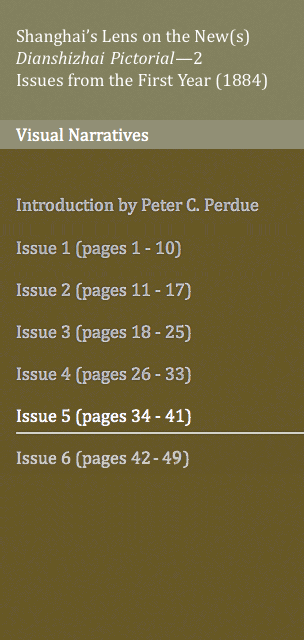| Images: Yale University Library, East Asia LibraryMassachusetts Institute of Technology © 2015 Visualizing Cultures |
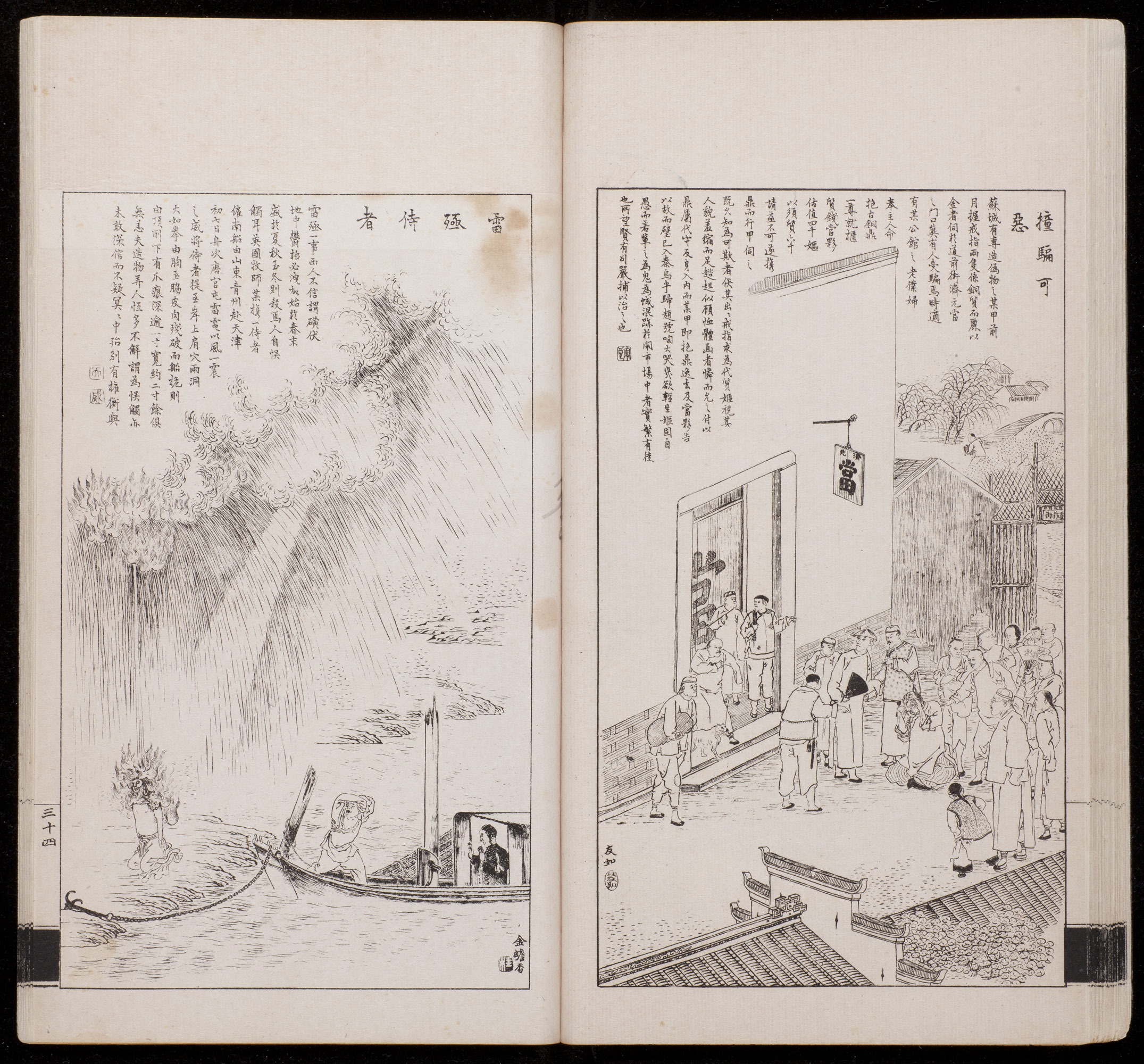 |
Title: “Hateful Swindlers” 撞騙可惡 Volume: 1 Issue: 5 Page Number: 34 Caption Translation: Mr. A in Suzhou specialized in counterfeiting goods. Last month he obtained a ring made out of copper and plated it with gold. He waited at the road in front of the Ji Yuan pawn shop, hoping to meet someone whom he could cheat. Just at that time an old female servant of a certain mansion, following her master’s orders, was carrying an ancient bronze tripod to the counter to change it for money. The pawnshop keeper offered her four thousand, but the old woman said it must be worth six thousand. She asked for a higher price but was refused, so she picked up the tripod and moved on. Mr. A watched her carefully, concluding that she was was a gullible person. Waiting for her to go out, he brought out the ring and offered to exchange it with her. The old lady looked at him, and he appeared shy and modest, his feet faltering and stumbling. Since he seemed to be a sympathetic and honorable person she pitied him and accepted his offer. She gave him the tripod and entrusting him to watch it, turned around to go back inside, while Mr. A grabbed the tripod and fled. |
Once the pawnshop clerk told her about the fake ring, it was too late. Qin had already stolen the jade; the bird had flown away to Zhao. The old lady wailed loudly, nearly wanting to give up her life. The old lady was indeed foolish, but there are too many demons and snakes, who carry out frauds in busy marketplaces. Virtuous officials must capture and severely punish them. Translator: Paul Vierthaler, revised by Peter C. Perdue Caption Text: 蘇城有專造偽物之某甲, 前月握戒指而隻, 係銅質而麗以金者, 伺於道前街濟元當之門口, 冀有人受騙焉。 時適有某公館之老僕婦, 奉主人命, 抱古銅鼎一尊就櫃質錢, 當夥估值四千, 嫗以須質六千, 請益不可, 遂携鼎而行。 甲伺之旣久, 知維可欺者。 俟其出, 出戒指求為代質, 嫗視其人, 貌羞縮而足趦趄, 似顧恤體面者, 憐而允之, 付以鼎屬代守, 反神入內, 而某甲即抱鼎逸去。 及當夥告以故, 而璧已入秦, 鳥乎歸趙, 號啕大哭, 幾欲輕生。 嫗固自愚, 而若輩之為鬼為蜮, 混跡於鬧市塲中者, 實繁有徒也, 所望賢有司嚴捕以治之也。 View on Yale Visual Resources |
Title: “The Servant Killed by Lightning” 雷殛侍者 Volume: 1 Issue: 5 Page Number: 34 Caption Translation: Western people do not believe that someone could be killed by lightning. They say that sulfur buried in the earth builds up and has to be released. It begins to accumulate in the spring, and by the end of summer and early fall it has not quite reached its peak. When winter arrives it then explodes, killing people who are nearby. A British missionary once brought a servant and hired a boat to go from Shandong’s Qingzhou to Tianjin. After seven days the boat arrived on schedule at Tang Guan Dun, where powerful thunder, lightning and wind shook them. A stroke of lighting flung the servant onto the bank. On his shoulder were holes as large as fists, and from his chest to his ribs his flesh was torn open. The mast of the boat had split from the top, and there was a crack deeper than one inch and as wide as perhaps more than two inches. Everyone else was safe and sound. For there are many things we do not understand about the actions of Nature; it is hard to believe that these events are simply accidents. But there is no doubt that the mysteries of the cosmos have their own logic and balance. Translator: Paul Vierthaler, revised by Peter C. Perdue |
Caption Text: 雷殛一事西人不信, 謂磺伏地中, 郁極必洩, 始於春末盛於夏秋, 至冬則殺焉, 人自悮觸耳。 英國牧師某携一侍者僱南船由山東青州赴天津。 初七日舟次唐官屯雷電以風一震之威將侍者提至岸上。 肩穴兩洞大如拳, 由胸至脇皮肉殘破, 而船桅則由頂削下有爪痕, 深逾一寸寬約二寸, 餘俱無恙。 夫造物弄人恆多不解, 謂為悮觸亦未敢深信, 而不疑冥冥中殆別有權衡歟 View on Yale Visual Resources |
 |
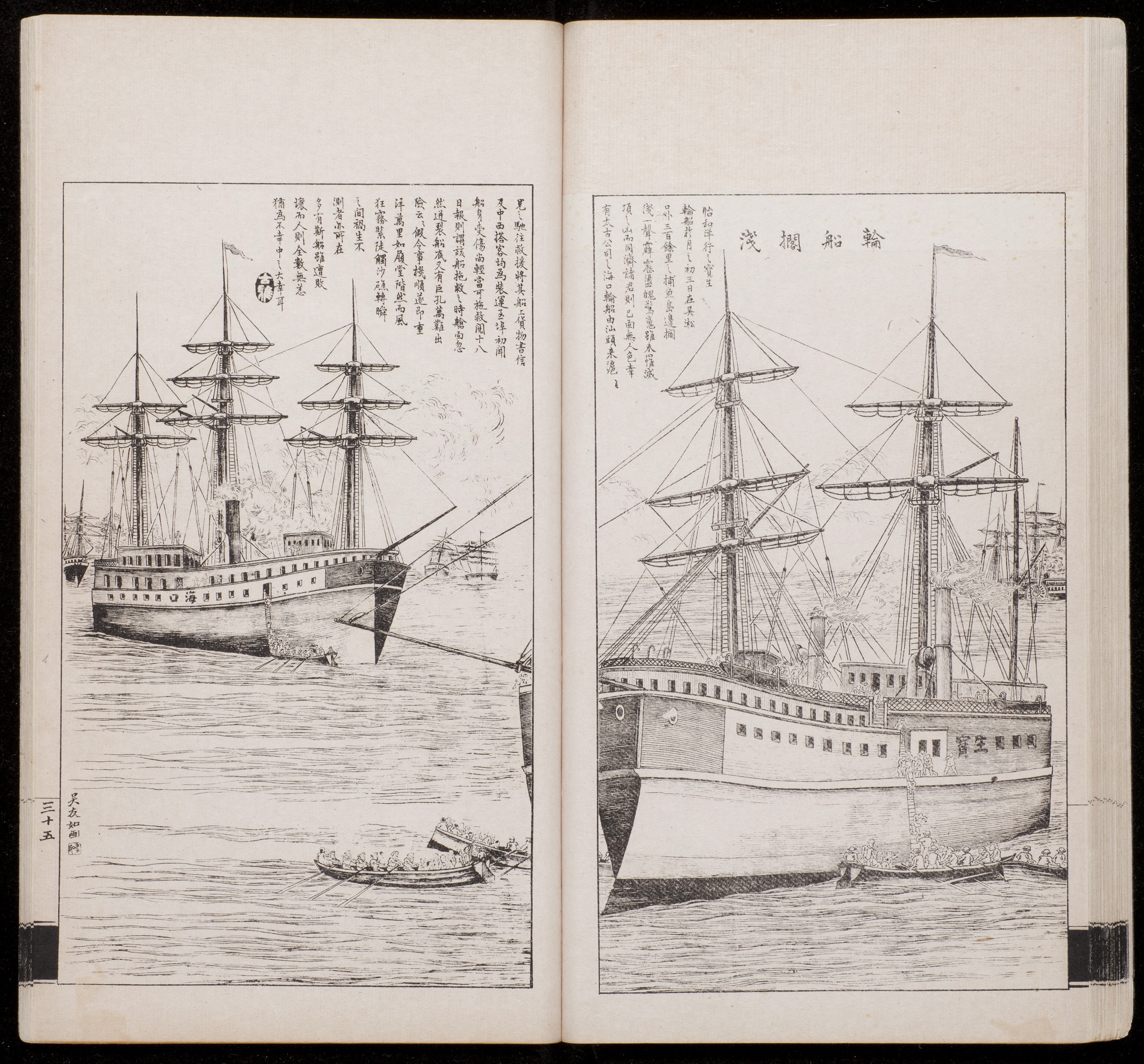 |
Title: “A Steamship Stranded” 輪船擱淺 Volume: 1 Issue: 5 Page Number: 35 Caption Translation: The Baosheng steamship of the foreign firm Jardine Matheson, in the first three days of the month became stranded on the shore of a fishermen's island around three hundred li (one hundred miles) outside the mouth of the Wu Song river. [When it ran aground], a sound like a thunderclap terrified the crew. Although none of them drowned, all of the gentlemen on the boat turned pale with shock. Fortunately, the Swire company’s Hai Kou steamship travelling from Shantou to Shanghai saw them and sped to the rescue. It unloaded the commodities, packages, and Chinese and Western passengers from the boat, and transported them to the shore. Initially, they thought that the boat’s hull had been only slightly injured, and they should be able to preserve it. But according to the news on the 18th, when they towed this boat to save it the deck suddenly burst open. The hull also had a large hole, so it was a dangerous rescue. When the seas are smooth all around, sailing is as easy as mounting the steps of a hall, but when strong winds and dense fog suddenly send the boat onto a shoal, then in the blink of an eye disaster strikes without warning. Thus, even though the boat was wrecked, all the people were safe and sound. This was good fortune in the midst of calamity. |
Translator: Paul Vierthaler, revised by Peter C. Perdue Caption Text: 怡和洋行之寶生輪船於月之初三日在吳淞口外三百餘里之捕魚島邊擱淺。 一聲霹靂盪魄驚魂, 雖未罹滅頂之凶, 而同濟諸君則已面無人色, 幸有太古公司之海口輪船由汕頭來滬, 見之馳往救援將其船上貨物書信及中西搭客均為裝運至埠。 初聞船身受傷尚輕, 當可施救, 閱十八日報, 則謂該船拖救之時艙面忽然迸裂, 船底又有巨孔, 萬難出險云云。 假令事機順遂即重洋萬里如履堂階, 然而風狂霧緊陡觸沙礁, 轉瞬之間禍生不測者, 亦所在多有。 斯船雖遭敗壞, 而人則全數無恙, 猶為不幸中之大幸耳。 View on Yale Visual Resources |
 |
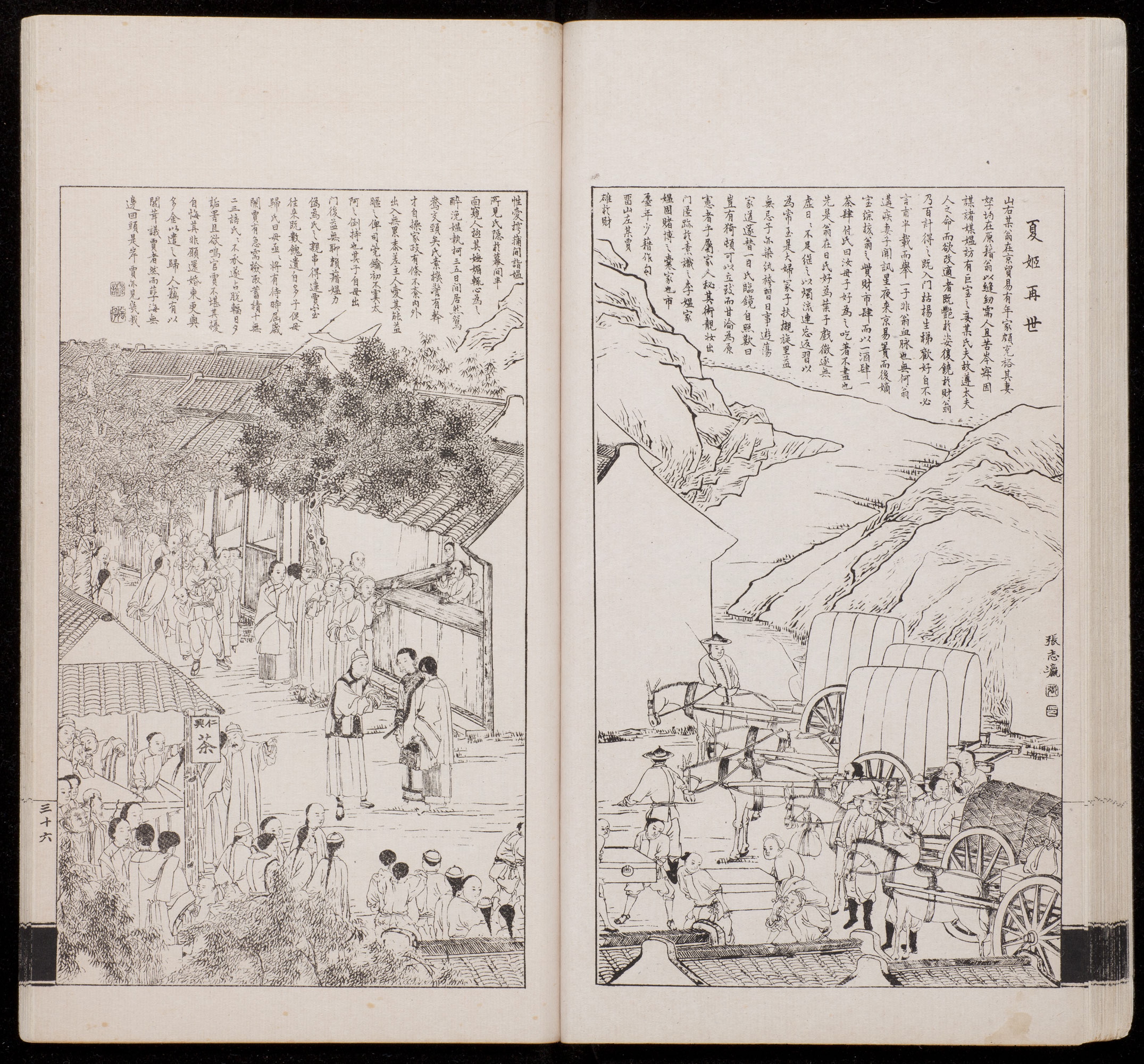 |
Title: “The Lascivious Beauty Xia Reborn” 夏姬再世 Volume: 1 Issue: 5 Page Number: 36 Caption Translation: An old merchant from Shanxi province did business in Beijing for many years and become quite wealthy, while his wife and children remained in his home town. Feeling lonely, he wanted female companionship. He consulted a matchmaker, who discovered a certain concubine living in a grand household. Her master, following his mother’s orders, agreed to send her to another man. Since she was both good looking and wealthy, the old man schemed desperately to obtain her. |
After their marriage, it was as if a withered tree had sprouted again. Their intimate pleasure needs no description. Within half a year a son was born, who, clearly, did not belong to the old man. Soon after, the old man fell ill. Hearing the news, his wife and children rushed to the capital. After removing the man’s body from his death bed, the senior wife examined his savings and businesses, and bestowed a liquor store as well as a tea shop on the concubine, saying, “If you and your son should manage them well, they will be more than enough for your food and clothing.” Before, when the old man was alive, the concubine enjoyed playing cards. Not even for one day would she stop playing the game. When the day ended she continued gambling by candlelight. She enjoyed it so much that she would completely forget herself, and this became her habit. Now since the senior wife and the senior son had accompanied the coffin back home, the concubine and her son feared nothing. The concubine’s son gradually adopted foppish habits and devoted himself to dissipation. As a result, their household wealth slowly declined. One day, the concubine looked into a mirror and sighed to herself, “How can I be content with being Yuan Xian (a poor but highly moral Confucian scholar) when I can become Yi Dun (a wealthy merchant)?” She told her servants not to disclose her (gambling) skill, and disguised herself in fine dress to hide in the residence of her old acquaintance Madam Li. |
Madam Li’s residence was a gambling house where young men liked to hang out. One of them was a wealthy Shandong merchant who loved to gamble. One time, when he visited Madam Li’s place, he saw the concubine hidden behind the curtains. She peeked out at him, showing her charms with her face half revealed. The merchant, infatuated with her, asked Madam Li to be his matchmaker. Within three to five days, they had already became as intimate as two mandarin ducks. The concubine had long been sharp and able, and administered the household business in an orderly way. Inside and outside, there was nothing that entangled her. |
The merchant was so impressed with her ability that he gave her the keys to all his wealth, and did not realize that he was giving a sword to someone who would stab him in the back. Her son, once the mother went out, did nothing productive, relying on his relationship to his mother to get into the merchant's warehouse, constantly giving away enormous amounts. The son urged his mother to come home, but she said there was no urgency; she would wait until the end of the year. But the merchant faced a crisis, and when he investigated, he found that only twenty to thirty percent of his wealth remained. He scolded the concubine, but she denied responsibility. His luck had run out; he was bankrupt. Day and night he cursed her, and then considered going to court, but he could not bear to face the uproar. Now he regretted that he had not dissolved his marriage, and gave her money to send her back home. Everyone thinks that the merchant was very foolish, but as the Buddhists say: “the sea of regret is limitless; turn back and repent your sins.” The merchant rashly grabbed his chance for bliss, leading to his ruin. Translator: Paul Vierthaler, revised by Peter C. Perdue |
Caption Text: 山右某翁在京貿易有年, 家頗充裕, 其妻孥均在原籍, 翁以縫紉需人, 且苦岑寂, 因謀諸媒媼, 訪有巨室之妾某氏, 夫故遵太夫人之命而欲改適者, 既豔於姿, 復饒於財, 翁乃百計得之。 既入門, 枯楊生稊, 歡好自不必言。 甫半載, 而舉一子, 非翁血脉也。 無何, 翁遘疾, 妻子聞訊, 星夜來京, 易簀而後, 嫡室綜核翁之貲財市肆, 而以一酒肆一茶肆付氏曰:汝母子好為之, 吃著不盡也。 先是, 翁在日, 氏好為葉子戲, 征逐無虛日, 日不足, 繼之以燭。 流連忘返, 習以為常。 至是大婦冢子扶櫬, 旋里益無忌, 子亦染紈絝習, 日事遊蕩, 家道遂替。 一日, 氏臨鏡自照, 歎曰:豈有猗頓可以立致而甘淪為原憲者乎。 屬家人秘其術, 靚妝出門, 匿跡於素識之李媼家。 媼固賭博之囊家也, 市廛年少藉作勾留。 山左某賈雄於財, 性愛樗蒲, 間詣媼所, 見氏隱於幕間, 半面窺人, 恣其嫵媚, 輒心為之醉, 浼媼執柯, 三五日間, 居然鴛鴦交頸矣。 氏素機警有幹才, 每操家政, 有條不紊, 內外出入無累。 齋善主人愛其能益, 暱之俾司筦鑰 初不虞太阿之倒持也, 其子自母出門後, 益無聊賴, 藉媼力偽為氏之親, 串得達賈室, 往來既數餽遺, 自多子促母歸, 氏曰無亟, 將有待時届歲闌, 賈有急, 需檢取蓄貲積十無二三。 诘氏, 氏不承, 遂占脫輻, 日夕詬詈, 且欲鳴官, 賈不堪其擾, 自悔其非願還婚東更與多金以遣之歸, 人竊有以闒茸議賈者, 然而孽海無邊, 回頭是岸, 賈亦見幾哉。 View on Yale Visual Resources |
 |
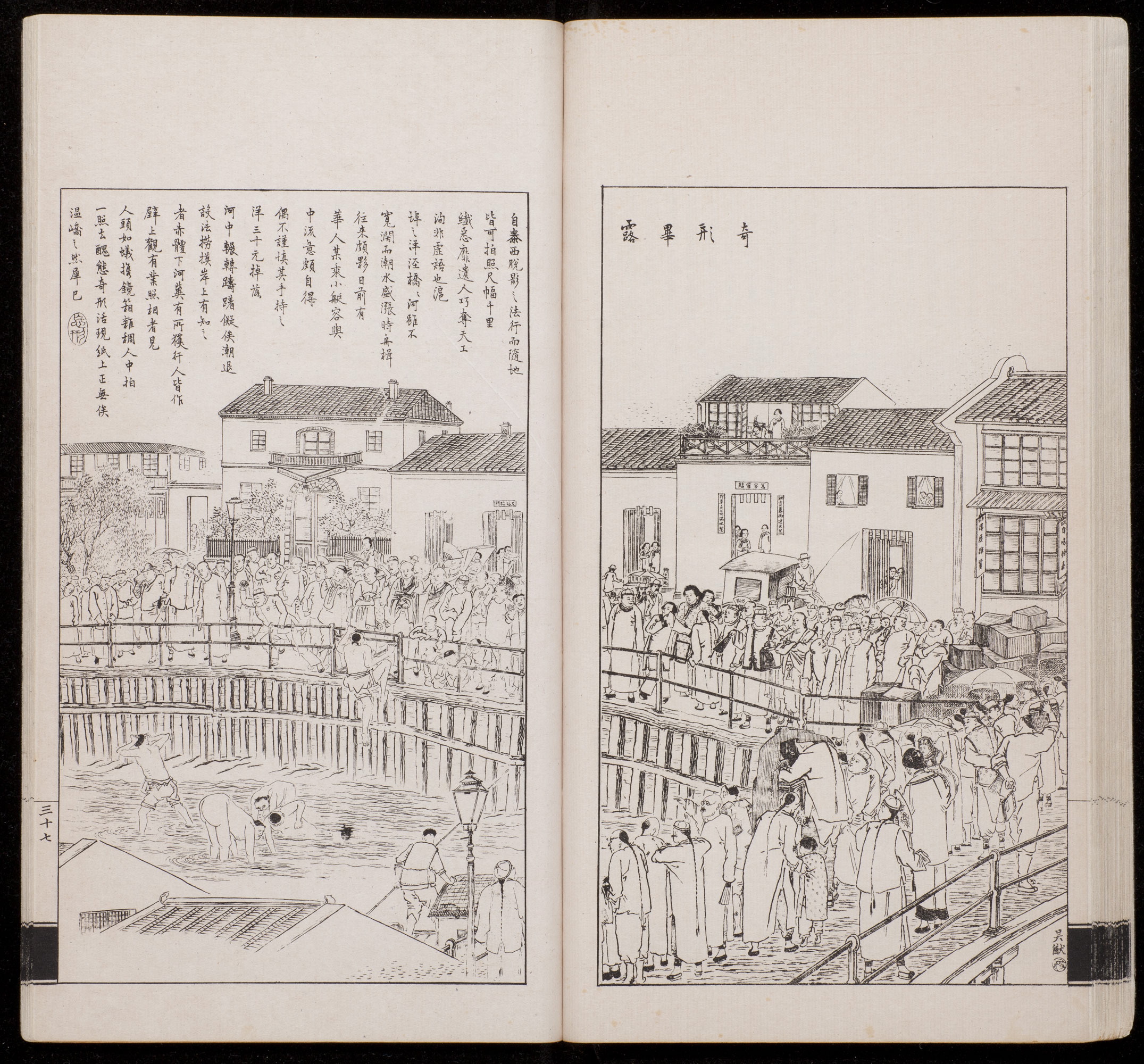 |
Title: “A Strange Incident Exposed” 奇形畢露 Volume: 1 Issue: 5 Page Number: 37 Caption Translation: Ever since the Western technique of photography started to become prevalent, pictures can be taken anywhere. Ten miles of landscape is epitomized in one foot, without the slightest detail left out. Indeed, this human artfulness excels that of Heaven. Under the Yangjing bridge in Shanghai, the surface of the river is not wide, but at high water, a large number of boats travel under the bridge. The other day, someone took a small boat to roam in the middle of the river just to enjoy himself, but he carelessly dropped thirty dollars into the river. Not knowing what to do, he planned to wait until ebb tide to find a way to recover them. Some people on the banks who learned about it jumped into the river naked, hoping to find something, as passers-by all watched from the bank. When a photographer saw so many heads crowded like ants, he placed his camera case among the crowd, took a picture and left. Indeed he did not need to act like king Wen Qiao, who burned the horn of a rhinoceros to expose naked demons in the river. Translator: Wang Guojun, revised by Peter C. Perdue |
Caption Text: 自泰西脫影之法行, 而隨地皆可拍照, 尺幅十里, 纖悉靡遺, 人巧奪天工, 詢非虛語也。 沪埠之洋涇橋, 橋河雖不寬闊, 而潮水盛漲時, 舟楫往來頗夥。 日前, 有華人某乘小艇, 容與中流, 意頗自得。 偶不謹慎, 其手持之洋三十元掉落河中, 輾轉躊躇, 擬俟潮退設法撈摸。 岸上有知之者, 赤體下河, 冀有所獲, 行人皆作壁上觀。 有業照相者, 見人頭如蟻, 携鏡箱雜稠人中, 拍一照去, 正無俟溫嶠之然犀已。 View on Yale Visual Resources |
 |
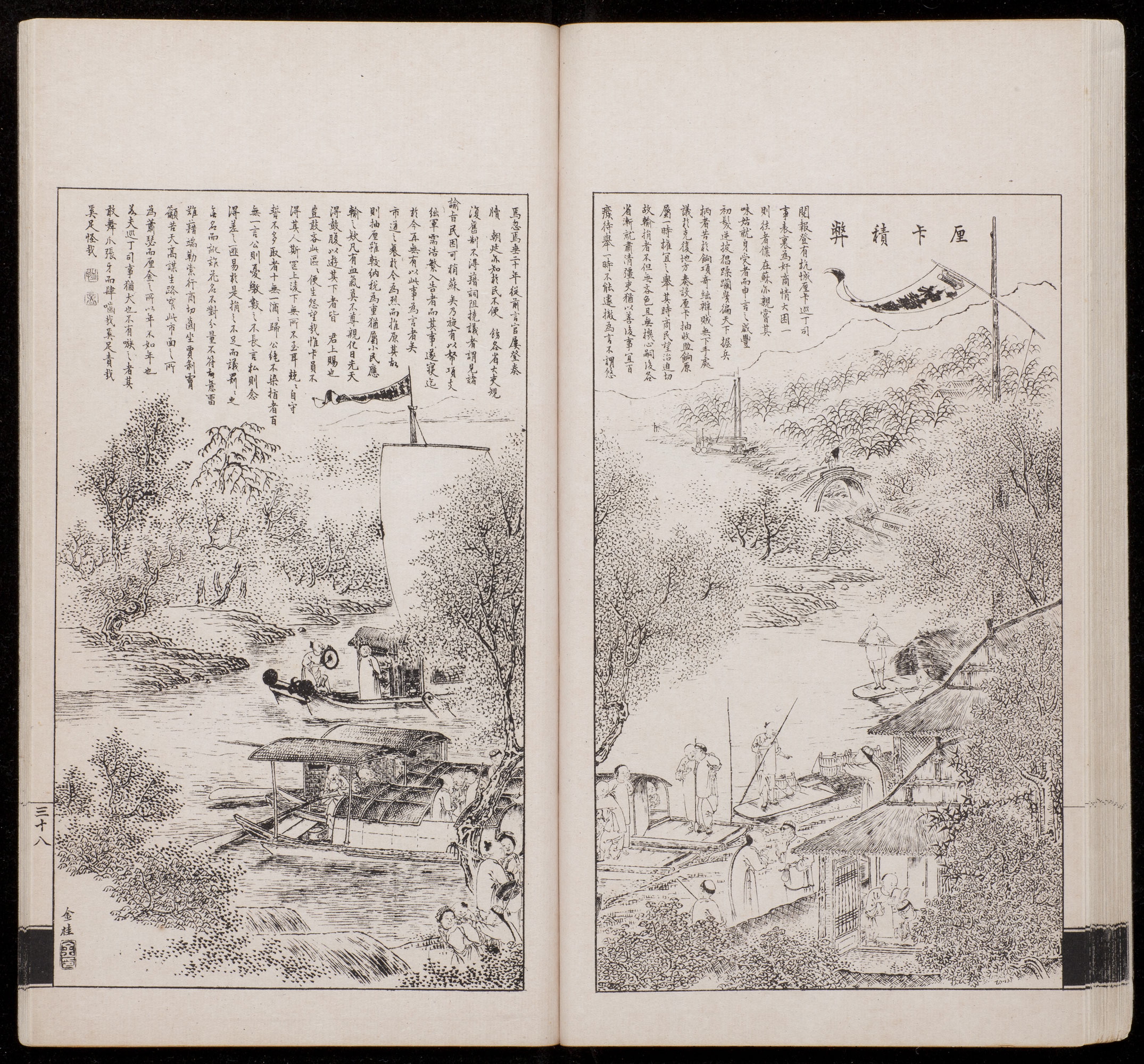 |
Title: “Serious Abuses in Toll Collection” 釐卡積弊 Volume: 1 Issue: 5 Page Number: 37 Caption Translation: I read a story in the newspaper which reported that the patrolmen and officers in a toll-gate of Hangzhou city colluded to commit abuses which severely obstructed trade. I also personally experienced this in Suzhou, so now I will tell you how I suffered. In the early Xianfeng reign [1850s], the Taiping rebel army was running rampant and ravaged almost the whole country. The imperial army severely lacked funding, and could find no way to subdue the rebels. The officers agreed to set up toll-gates in recaptured areas in order to levy commercial taxes (known as lijin) for military expenses. At first, this was a temporary expedient, when merchants and the people all keenly hoped for peace, so they contributely generously without deceit. Later as the provinces were pacified and the rebels exterminated, the officials claimed that during this period of recovery hundreds of abandoned works needed to be restored, so that the toll-gates could still not be removed. Who could imagine that these taxes would continue for twenty years? |
Previously, officials frequently presented critical memorials to the Emperor, and the court also recognized the burdens placed on the people, so it ordered provincial officials to restore the original system with no excuses. Commentators thought that this imperial edict would alleviate the people's hardship. Soon afterward, however, because of continual deficits and immense military expenditures, the idea of eliminating the toll-gates was abandoned and no one has mentioned it up to now. Now commerce has declined very seriously. The reason for this is that the lijin tolls are more burdensome than land taxes, yet all ordinary people have to pay them. Yet anyone who has blood and breath respects his parents. Similarly, anyone who travels under the clear sky with a full stomach has enjoyed the Emperor's favor. Why should such people be so discontented about such a small tax? The real reason is that the toll-gate officials are bad people. They deceive their superiors and oppress subordinates and the common people. They are completely out of control. Not one person out of ten meticulously abides by the rules and follows his oath not to take any more than he deserves. Not one out of a hundred would give all tax receipts to the state without having a finger in the pie. |
On the pretext of serving the public good, they claim that tax payments are too low; for their private interests, they make it difficult to secure this post. Therefore, when taxes are insufficient they threaten penalties. When there is no reason for penalties, they simply blackmail people with such excuses as inconsistent names or incorrect amounts, and so on. They intentionally detain people and squeeze them. Traveling merchants gnash their teeth with anger, and local businessmen are literally flayed alive. People cry out their bitterness to Heaven, but Heaven is far away; simply making a living is impossible. This is why trade has stagnated and tax revenue decreases year by year. The tax officials and their enforcers are like dogs. Without others instigating them, how could they dare to brandish their claws, bare their teeth and arbitrarily gnaw at us? Who is really to blame? Translator: Wang Guojun, revised by Peter C. Perdue |
Caption Text: 閱報, 登有杭城釐卡巡丁司事, 表里為奸, 商情大困一則。 往者僕在蘇亦親嘗其味, 姑就身受者而申言之。 咸豐初, 發逆披猖, 蹂躪幾遍天下, 握兵柄者苦於餉項奇絀, 辦賊無下手處, 議於克復地方奏設釐卡, 抽收助餉。 原屬一時權宜之舉, 其時商民望治迫切, 故輸捐者不但無吝色, 且無機心。 嗣後各省漸就肅清, 疆吏猶以善後事宜百廢待舉, 一時不能遽撤為言。 不謂悠焉忽焉, 垂二十年。 從前言官屢登奏牘, 朝廷亦知於民不便, 飭各省大吏規復舊制, 不得藉詞阻撓。 議者謂見諸諭旨, 民困可稍蘇矣。 乃旋有以幣項支絀, 軍需浩繁入告者, 而其事遂寢。 迄於今再無有以此事為言者矣。 市道之衰, 於今為烈, 而推原其故, 則抽釐雖較納稅為重, 猶屬小民應輸之款。 凡有血氣, 莫不尊親, 化日光天, 得鼓腹以遊其下者, 皆君上賜也, 豈敢吝此區區, 便坐怨望哉。 惟卡員不得其人, 欺蒙上凌下無所不至耳, 兢兢自守、誓不多取者十無一, 滴滴歸公、絕不染指者百無一, 言公則憂繳數之不長, 言私則念得差之匪易, 於是捐之不足而議罰, 罰之無名而訛詐, 花名不對, 分量不符, 故意留難, 籍端勒索, 行商切齒, 坐賈剝膚, 籲苦天高, 謀生路窄, 此市面之所為蕭瑟, 而釐金之所以年不如年也。 若夫巡丁司事, 猶犬也, 不有嗾嗾之者, 其敢舞爪張牙而肆嚙哉, 奚足責哉, 奚足怪哉。 View on Yale Visual Resources |
 |
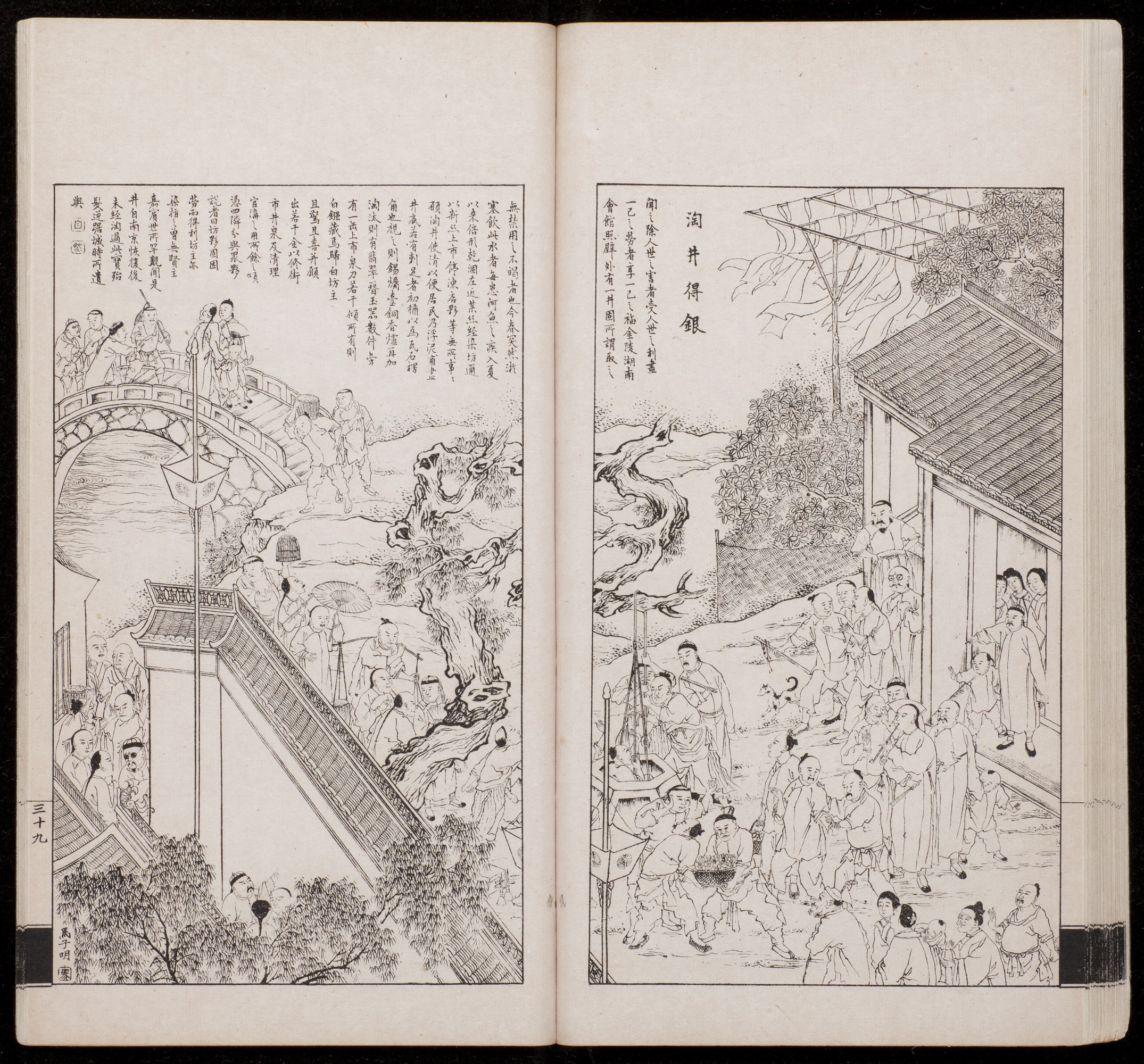 |
Title: “Finding Silver while Cleaning a Well” 淘井得銀 Volume: 1 Issue: 5 Page Number: 39 Caption Translation: They say that if you remove harm from the world, the world will reward you; and if you work hard for yourself, you will enjoy good fortune. In a guest house for Hunanese in Nanjing, there is a well outside the dividing wall, which used to be inexhaustible. This spring it suddenly silted up, and those who drank water from this well often suffered from diarrhea. This summer, it dried up completely. In a textile dyeing house nearby, the new silk had just been sent to market, so the idle shop assistants offered to dredge the well and make it limpid for the benefit of the local people. However, once the mud on the surface was removed, there seemed to be something at the bottom of the well pricking their feet. At first people thought it was the edges of tiles or stones; when they looked closely, it turned out to be tin candleholders and copper incense burners. After further washing and cleaning, they found several emerald hair clasps and jade artifacts, beside which was a tile vessel and on the vessel there were several ancient coins. When they emptied out all those things they found silver hidden beneath. |
They returned and reported to the owner of the dye house, who was both surprised and excited. He donated some of the money to repair the streets and wells, and to dredge ditches, and distributed the rest among the neighborhood and the shop assistants. The Commentator says: the shop assistants benefited from their efforts, and the dye house owner also shared in the reward. In this world, virtuous masters and diligent servants are hard to find. Apparently, ever since Nanjing was recaptured, this well had never been cleaned. These treasures had been left there by the Taiping rebels when they held the city. Translator: Wang Guojun, revised by Peter C. Perdue Caption Text: 聞之除人世之害者, 受人世之利;盡一己之勞者, 享一己之福。 金陵湖南會館照壁外有一井, 固所謂取之無盡、用之不竭者。 今春突然淤塞, 飲此水者, 每患河魚之疾。 入夏以來, 倍形乾涸, 左近某絲經染坊, 邇以新絲上市停練, 店伙等無所事事, 願淘井使清, 以便居民。 乃浮泥甫盡, 井底若有刺足者, 初猶以為瓦石棱角也, 視之則錫燭台、銅香爐;再加淘汰, 則有翡翠簪、玉器數件, 旁有一缶, 上布泉刀若干, 傾所有則白鏹藏焉。 歸白坊主, 且驚且喜, 並願出若干金以修街市井泉及清理官溝之用, 所餘之項, 憑四鄰分與眾伙。 說者曰, 坊伙固因勞而得利, 坊主亦染指之, 曾無賢主嘉賓, 世所罕見。 聞是井自南京恢復後, 未經淘過, 此寶殆發逆踞城時所遺與。 View on Yale Visual Resources |
 |
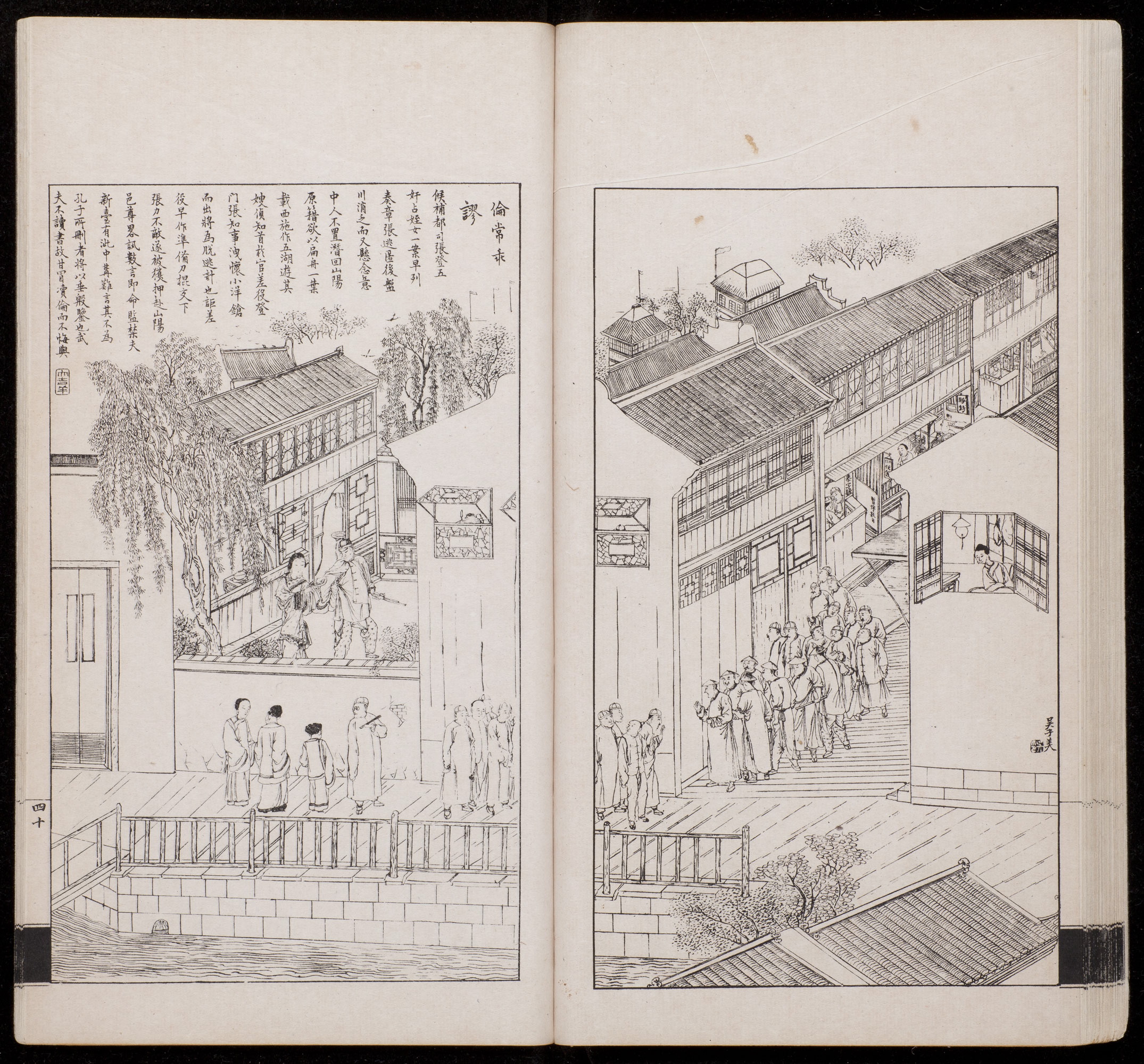 |
Title: “Decency Violated” 倫常乖謬 Volume: 1 Issue: 5 Page Number: 40 Caption Translation: Several memorials have already reported the case of candidate military official Zhang Dengwu, who raped his niece. During his escape, Zhang ran out of money, and he longed so much for his sweetheart that he secretly returned to his home county Shanyang in the hope, as they say, of renting a boat and "carrying Xi Shi (an ancient beauty) across the five lakes." His sister-in-law learned about his return and reported it to the authorities. When government runners came to his house, he knew that he had been detected, so carrying a little foreign gun, he planned to run away. But the runners were prepared, so they instantly beat him with knives and clubs, and Zhang was not powerful enough to fight back. He was sent to the county office under escort. After a short interrogation, the county magistrate ordered him detained. The Book of Songs contains a story about a king having adulterous relations with his sister-in-law. Immoral acts in the inner chamber are painful to reveal, but Confucius kept them in Book of Songs in order to admonish later generations. The military official had not read the classical texts, which might explain why he violated the basic codes of decent morality without regret. Translator: Wang Guojun, revised by Peter C. Perdue |
Caption Text: 候補都司張登五奸占侄女一案, 早列奏章, 張逃匿後, 盤川消乏, 而又懸念意中人不置, 潛回山陽原籍, 欲以扁舟一葉載西施作五湖遊。 其嫂偵知, 首於官, 差役登門, 張知事洩, 懷小洋鎗而出, 將為脫逃計也。 詎差役早作準備, 刀棍交下, 張力不敵, 遂被獲, 押赴山陽, 邑尊畧訊數言, 即命監禁。 夫新臺有泚, 中冓難言, 其不為孔子所刪者, 將以垂般鑒也。 武夫不讀書, 故甘冒瀆倫而不悔與。 View on Yale Visual Resources |
 |
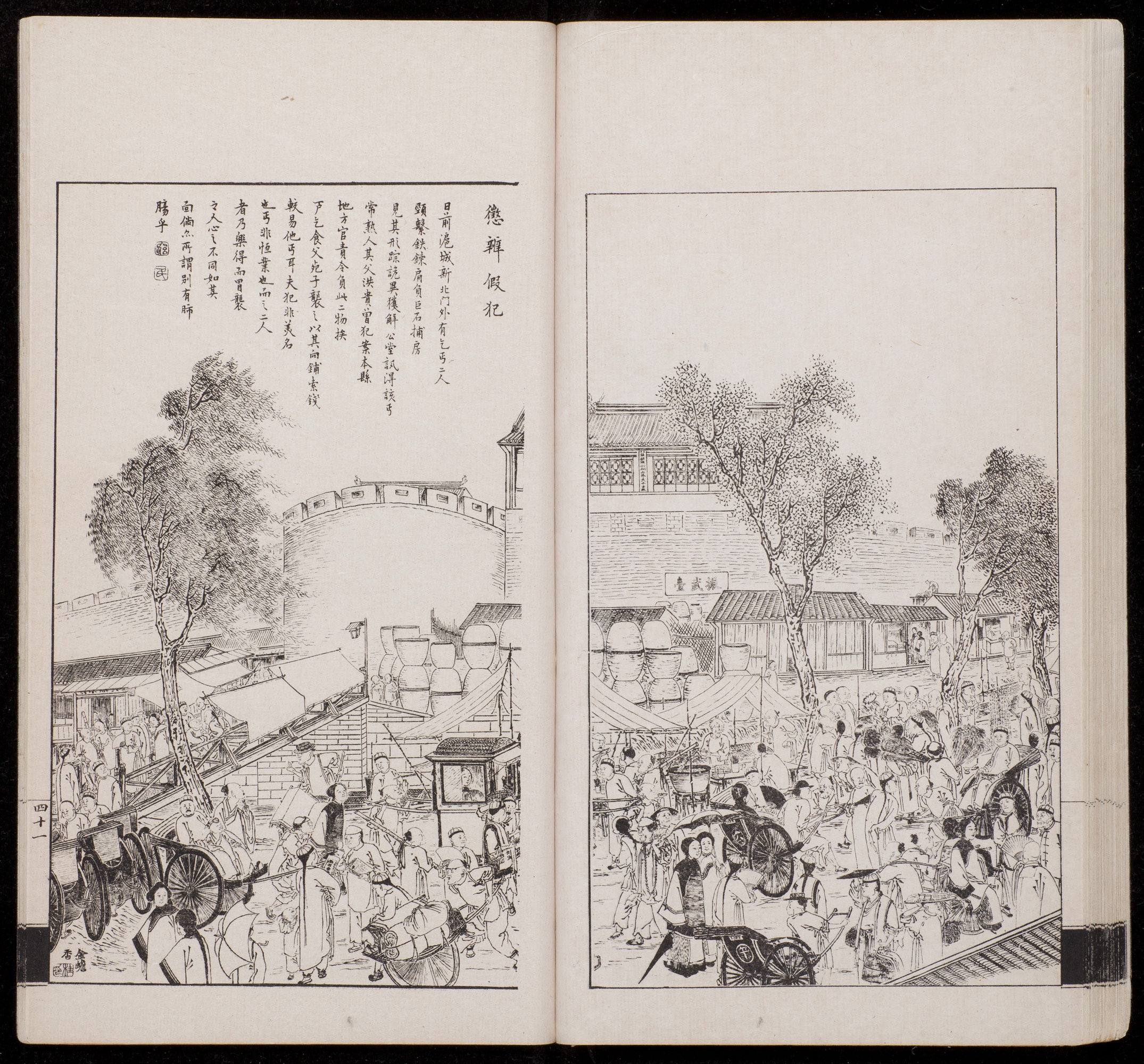 |
Title: “Punishing a Fake Criminal” 懲辦假犯 Volume: 1 Issue: 5 Page Number: 41 Caption Translation: Punishing Fake Criminals. The other day, there were two beggars outside the new north gate of Shanghai. They carried iron chains on their necks and huge rocks on their shoulders. Seeing that their suspicious behavior, the policemen arrested them and took them to court. After interrogation it became known that these beggars were from Changshu, and their father Hong Gui had once committed a crime in this county. The local official ordered Hong to carry these two objects and beg from door to door. After the father died his sons carried on this activity since it was easier for them than for other beggars to obtain money from shops. It is not reputable to be a criminal, and begging is not a steady profession, yet these two people were lucky enough to carry it on falsely. What lies in the human heart is quite different from superifical appearance. Is this is why we talk about "exposing hidden intentions"? Translator: Wang Guojun, revised by Peter C. Perdue |
Caption Text: 日前, 沪城新北門外有乞丐二人, 頸系鐵鏈, 肩負巨石。 捕房見其行蹤詭異, 獲解公堂, 訊得該丐常熟人, 其父洪貴曾犯案本縣, 地方官責令負此二物, 挨戶乞食。 父死子襲之, 以其向鋪索錢較易他丐耳。 夫犯非美名也, 丐非恆業也, 而之二人者, 乃樂得而冒襲之。 人心之不同如其面, 倘亦所謂“別有肺腸”乎? View on Yale Visual Resources |
| “Hateful Swindlers” 撞騙可惡 (page 34), “The Servant Killed by Lightning” 雷殛侍者 (page 34) 1884 [dz_v01_036] |
“A
Steamship Stranded” 輪船擱淺 (page 35) 1884 [dz_v01_037] |
“The Lascivious
Beauty Xia Reborn” 夏姬再世 (page 36) 1884 [dz_v01_038] |
“A Strange
Incident Exposed” 奇形畢露 (page 37) 1884 [dz_v01_039] |
“Serious Abuses
in Toll Collection” 釐卡積弊 (page 38) 1884 [dz_v01_040] |
“Finding Silver
while Cleaning a Well”
淘井得銀 (page 39) 1884 [dz_v01_041] |
“Decency Violated” 倫常乖謬 (page 40) 1884 [dz_v01_042] |
“Punishing a
Fake Criminal” 懲辦假犯 (page 41) 1884 [dz_v01_043] |
